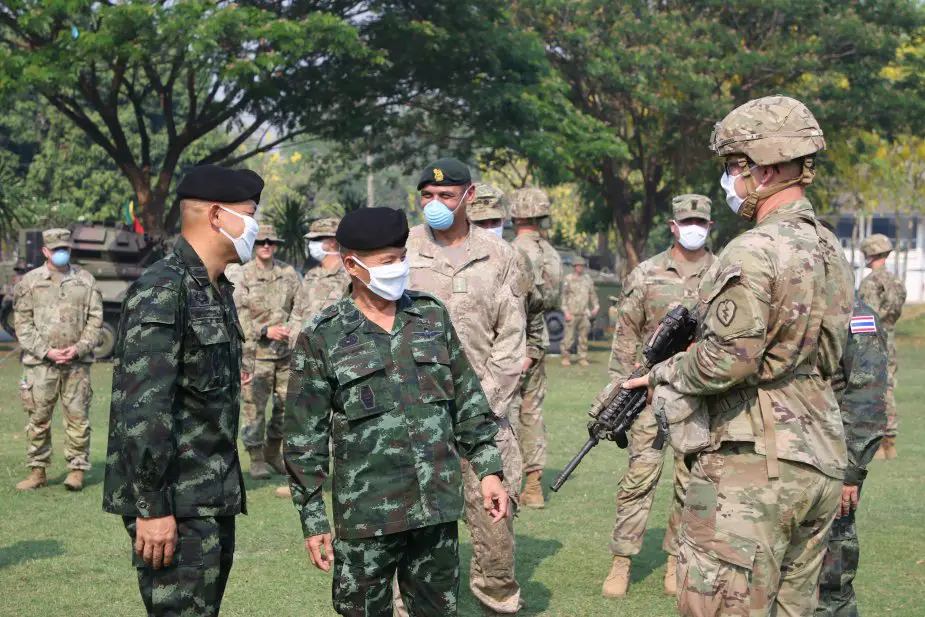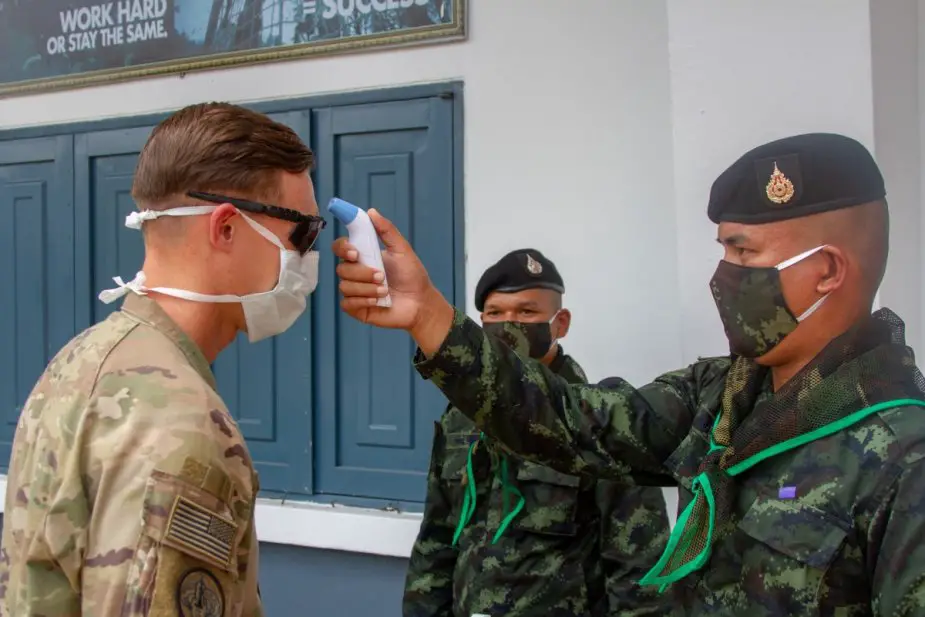Breaking news
U.S. Chief of staff foresees greater Army commitment in Indo-Pacific region.
After COVID-19 forced the Army to shutter or curtail major exercises, the service’s top officer said Wednesday, May 27, that Soldiers will soon return to train with partners in the Indo-Pacific region. Pacific Pathways, a series of exercises where units conduct several stops and train with foreign militaries in an expeditionary-style deployment, has been temporarily halted after the Defense Department issued a stop-movement order, slated to end June 30. Sean Kimmons, Army News Service, reports. “Our intent is to get back with these exercises as soon as the conditions allow,” said Gen. James C. McConville, the Army’s chief of staff. “We have to stay ready.”
Follow Army Recognition on Google News at this link

RTA Maj. Gen. Takad Lordsiri, commander of the 9th Infantry Division, speaks with a U.S. Soldier at Fort Kanchanaburi, Thailand, during the opening ceremony of the Hanuman Guardian 20 exercise March 31, 2020 (Picture source: Pfc. Lawrence Broadnax)
The decision is part of the Army’s overall return to collective training after safety measures, such as masks, physical distancing, screening and testing for the virus, recently proved successful with recruits at basic training sites. “We’re putting procedures in place for our troops so they can still operate in this environment and make sure that we continue our relationships,” he said. Speaking at the virtual Indo-Pacific Landpower Conference 2020, the general understood that nations, as well as the U.S., have felt the impact of COVID-19 and may be preparing for a potential second wave.
Despite the outbreak, great power competition with near-peer adversaries still exists and, in some cases, has intensified, he told leaders representing over 20 armies in the region. “We need to continue to think beyond the geography of the borders,” he said. “As we protect our forces who protect our nations, we must remember that there are other options that we have to maintain strength.”
Those include multinational exercises and exchanges, he added, but also information sharing as well as creative processes and organizations that can help preserve regional stability. “Cooperation during crisis strengthens that trust and demonstrates our resolve to continue to live in a rules-based international order,” said Gen. Paul LaCamera, commander of U.S. Army Pacific, which hosted the two-day conference. “Things will normalize,” he added. “We will either return to a normal or adapt to a new normal, but either way we will figure it out as a team of allies and partners.”
When the outbreak initially hit, about 2,000 U.S. and Thai soldiers had to adapt using protective measures while conducting Pathways exercises in Thailand. Gen. Apirat Kongsompong, chief of the Royal Thai Army, said both forces showed great discipline to safely work with each other until the training concluded in April. He now plans to send Thai soldiers to Hawaii soon to continue their partnership. “In the army, we have good protection and a very good way to deal with COVID-19,” he said.
LaCamera said that USARPAC expects to complete all of its Pathways exercises scheduled for this year, based on local conditions. “If we can get into your nations to train and continue this partnership, we will,” he said to the other leaders. “We understand that dealing with the coronavirus will have an impact on that.”
Pathways will also likely expand in scope and complexity in the future, LaCamera said, so it can move beyond a series of bilateral exercises to multilateral ones. “Pathways is so important to us, because it develops trust from the individual Soldier to the chief of the army levels,” he said. “It improves interoperability and prepares all of our forces for a future conflict, while simultaneously deterring our adversaries from initiating conflict.”
He also invited troops from other nations to train at USARPAC’s jungle and arctic warfare centers to hone their skills. “These are unprecedented times, but we must make a concerted effort to remain connected to share best practices and lessons learned,” he said.
With roughly 75,000 Soldiers fighting the virus on the homefront, McConville reaffirmed that the U.S. Army is still committed to its partners in the Indo-Pacific. The partnerships forged over the years are still critical, he said, and cannot be broken by a virus. “It’s an invisible enemy, so to speak, that we all face,” he said of the virus. “But we all share the same interests in protecting our forces, protecting our people and similar interests in the region. I don’t see that at all,” he said of withdrawing forces from the Indo-Pacific to battle the virus at home. “In fact, I see a larger commitment in the region.”

Capt. Andrew Borrebach, commander of Alpha Company, Task Force Cacti, 3rd Infantry Brigade Combat Team, 25th Infantry Division, gets his temperature checked as a preventative measure against COVID-19 on March 29, 2020, Krabi, Thailand, by Royal Thai Army medical personnel during the Hanuman Guardian exercise (Picture source: Spc. Ezra Camarena)


























